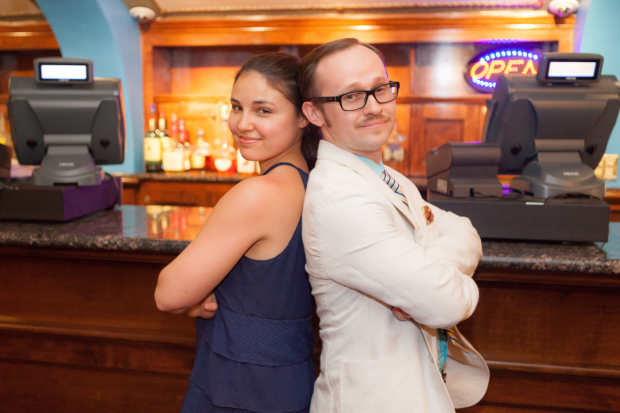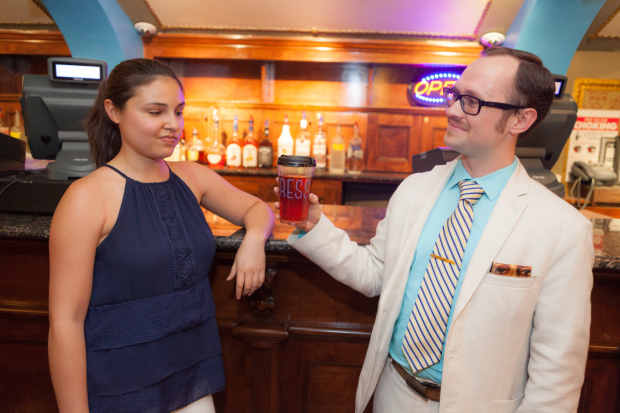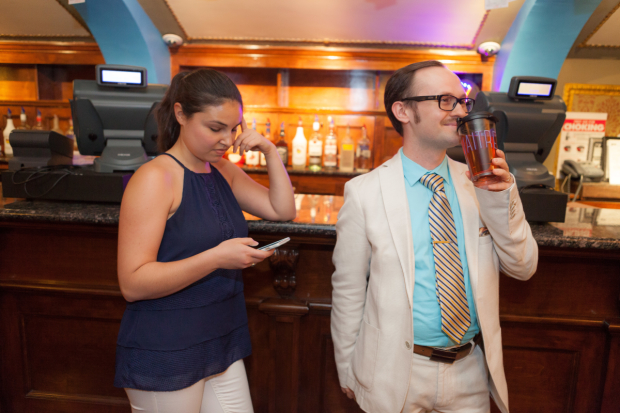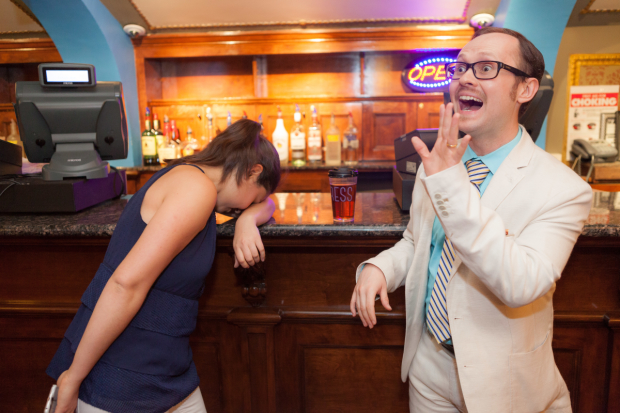Point-Counterpoint: Are Intermissions Necessary?
Two TheaterMania critics argue the merits of halftime at the theater.
Intermission, huh…what is it good for? Absolutely nothing, if you're the kind of serious theatergoer who likes to consume a drama all in one unrelenting dose. Why take all that time to establish a mood and a story if you're just going to interrupt it with snack time and merch sales? Still, some audience members cherish intermission, seeing it as a vital time to socialize, rehydrate, and, crucially, go to the bathroom. Critics Hayley Levitt and Zachary Stewart debate the pros and cons of intermission in the following Point-Counterpoint (#GiveMeABreak):

(© Seth Walters)
Zachary Stewart: So Hayley, I've noticed you groan every time you hear a show has an intermission. What is that all about?
Hayley Levitt: To preface, I'll concede that intermissions can be necessary when there's either A) a major set change or B) a lead actor who needs a break from a role that's incredibly strenuous physically. Aside from those cases, I think the intermission's only functions are to take us out of the story and make us get home 20 minutes later.
Zach: I think you've left out a vital human function in that supposition. My appreciation for intermissions has an inverse relationship to the capacity of my bladder. I never used to care for them, but as I've grown older, I've come to respect their necessity. It's hard to stay in the story when all you can think about is how much you need to pee.
Hayley: Unless you're seeing an experimental marathon show that runs eight hours on a Saturday, a piece of theater runs three hours at most (or 2:40 without an intermission). Of all the things we require of audiences, asking them not to pee for two-and-a-half hours is not an outrageous request. Everyone going to see Wonder Woman seems to be fine.
Zach: People can leave during Wonder Woman (or any other piece of Hollywood superhero schlock) and come back not having missed much. At its best, the theater requires another level of mental engagement, so a brief pause to relieve ourselves both mentally and physically is often a necessity. Two-and-a-half hours without an intermission seems like a needlessly cruel way to torture the audience.
[Zach leaves for a bathroom break.]
Hayley: [speaking loudly] I agree that theater can often require more mental engagement than movies, by virtue of the fact that it's up to our imaginations rather than film editing or special effects to fill in the gaps of the world that's being mapped out for us onstage. There's momentum involved. It takes time and energy to internalize the rules that apply to the universe of the play. When you're taken out of that universe, snapped back to reality, and then thrown back into the show 20 minutes later, maybe you're not completely back at square one, but you take a few steps backwards and have to do that internal adjustment again. Why force us to do that twice when we could just do it once and stay inside the story the whole way through?
[Zach returns with scotch in a sippy cup and a box of Raisinets.]

(© Seth Walters)
Zach: It is also sometimes important to break during a natural pause in the story. For instance, the first act of Clybourne Park takes place in 1959, while the second act is in 2009. The intermission between those two acts helps facilitate the director's task of getting us to time-travel between those two eras. It's not just about changing the set: We experience the world of the first act, we digest, and then we take in the world of the second act. The idea that a play should maintain one consistent universe throughout the production can only lead to some very bland, undynamic theater.
Hayley: I can get on board with pauses between acts. Two to three minutes to let us absorb the piece of story we've just seen and draw a mental line between it and the next chapter makes complete dramatic sense. But (aside from accommodating overhydrated audience members) the only reason to extend that break to 15 or 20 minutes is to sell us overpriced drinks and branded T-shirts.
Zach: Oh cruel taskmistress! When was the last time you waited in a bathroom line on Broadway? Sometimes it takes 10 minutes just to get into a stall. This is especially a problem for women, who make up 67 percent of the theatergoing audience (according to the Broadway League) and require a little more quality time with the porcelain.

(© Seth Walters)
Hayley: As someone who doesn't suffer from Broadway Bladder, I can't personally identify with your attachment to the bathroom break. But I'll take your word for it. However, I will argue that intermissions may actually sabotage a lot of productions. Other than peeing and purchasing merch, what do people do during intermissions? They criticize the show. And I don't know about you, but if the person sitting next to me spends 15 minutes picking apart the flaws of Act 1 (which we can't even label as flaws yet since we still have at least an hour of story and context left to take in), it puts a shadow of doubt over the entire thing. Before I even sit down for Act 2, I've jumped off the train and find myself waiting for whatever is in front of me to fall off a cliff. Premature criticism in the theater can be deadly.
Zach: You and I both know that critics can be wrong, especially the premature variety. Next time you hear a naysayer sounding off during an intermission of a show you like, tell them why they are wrong. As the recent Shakespeare in the Park production of Julius Caesar has shown, one of the thrilling (and dangerous) things about live theater is that it brings us together in the same physical space and asks us to wrestle with big ideas. Intermission is an excellent time to hash those ideas out, while keeping an open mind for what the creative team has in store for Act 2.
Hayley: I think a bar after the show is the place for that. And if we scrap this intermission nonsense, imagine all the extra drinking time!
Zach: As you intimated in your first comment, scrapping the intermission only leads to people going home faster so they can check Facebook, watch Netflix, and fall asleep. If those 20 extra minutes are really putting you out, you should reconsider what you're even trying to get out of the theater. This is a time to commune with your fellow humans, rather than rushing from one screen to the next.

(© Seth Walters)











